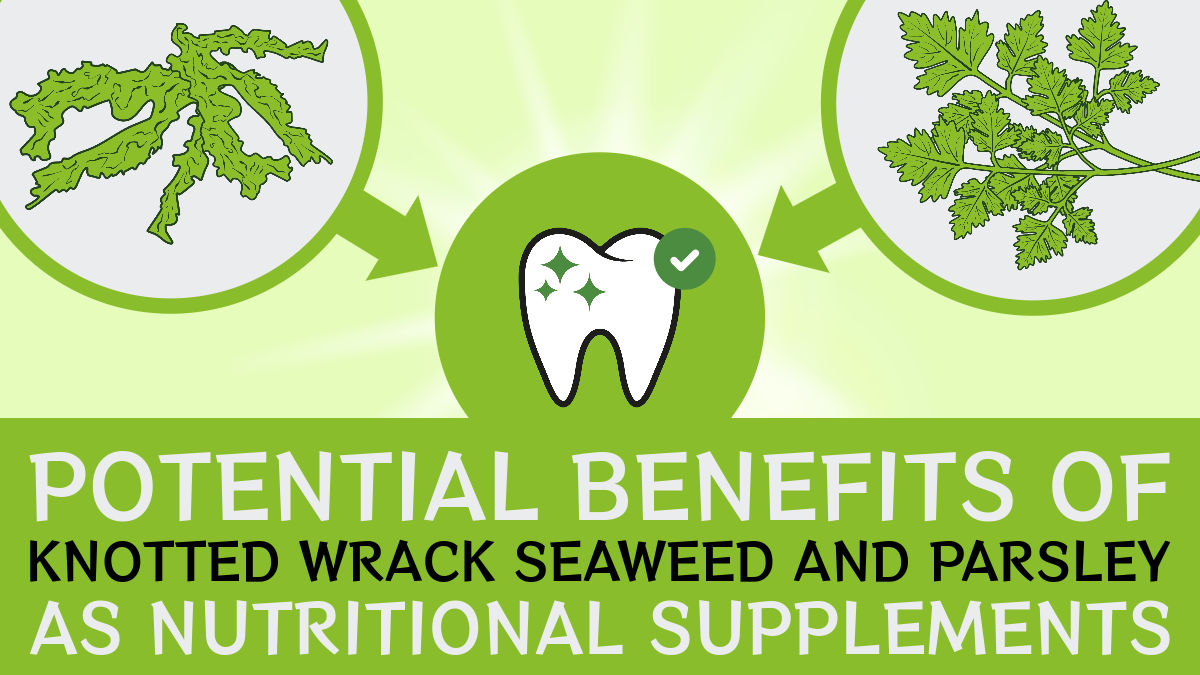Knotted Wrack
In recent years, many pet owners have turned to natural, holistic remedies to ensure their pets’ continued health and wellbeing. One remedy that has recently gained traction is Ascophyllum nodosum, also known as knotted wrack, for its dental health benefits in dogs.
Ascophyllum nodosum is a type of brown seaweed that contains a number of beneficial compounds, including vitamins, minerals, antioxidants, and other polyphenol compounds. Studies have shown that these compounds have powerful anti-inflammatory and antimicrobial properties, making them ideal for use in treating inflammation and infection within the mouth (1). In addition, the compound fibers within the seaweed can help bind oral bacteria, reducing the amount of bad bacteria accumulating in your dog's mouth while concomitantly helping to reduce the amount of tooth decay (2).
Not only can kelp’s antibacterial properties help reduce the risk of periodontal disease, but the bioactive compounds found in Ascophyllum nodosum can also help to reduce the amount of plaque accumulation on your dog's teeth, helping to support a healthy oral environment. By reducing plaque buildup, kelp can also help reduce the risk of a number of dental issues, such as bleeding gums, bad breath, and tooth decay (3).
In addition to providing dental health benefits, Ascophyllum nodosum is also believed to help improve overall canine health, as studies have suggested that it can support increased skin health and immune system function (4).
In conclusion, Ascophyllum nodosum, or knotted wrack, can be a great remedy for improving your dog's dental health. The beneficial compounds found in this brown seaweed can help fight inflammation and plaque accumulation in the mouth, reducing the risk of periodontal disease and other dental issues. Furthermore, providing your pup with kelp may also provide additional health benefits, such as improved skin health and immune system function.
Parsley
Parsley is often believed to be one of the most beneficial herbs for dogs due to its high nutrient content. Parsley has been widely used for centuries for its nutritional and medicinal properties, but it is only recently that its dental and oral benefits for dogs have gained recognition. From freshening breath to reducing plaque and tartar, its powers should not be underestimated.
A recent study conducted by the University of California Davis School of Veterinary Medicine found that parsley can help reduce the buildup of plaque on a dog’s teeth, thanks to its high levels of chlorophyll. The antimicrobial aspect of chlorophyll helps control oral bacteria and can have a dental-cleaning effect. Not only does the chlorophyll assist in fighting the bad bacteria, but the crunchiness of the leaves helps to scrub the teeth and soften tartar.
Parsley has an analgesic (painkilling) effect on the gums too, and this can help prevent mouth injuries caused by vigorous chewing and rough games of tug-of-war. This is partly due to its rich supply of vitamins, minerals and antioxidants which can protect the gums and other parts of the mouth from damages too. (5)
The herb can also help freshen your pup’s breath naturally. Digestion issues or the buildup of bacteria can cause bad breath, and adding some parsley to your pup’s diet can effectively reduce any odour. The antioxidants in parsley can also get rid of smelly bacteria and help deodorize the mouth. (6)
In addition to its dental and oral benefits, parsley also contains high levels of vitamins, minerals and antioxidants that are essential to a pup’s overall health. Its high fiber content can also help with digestion, and its vitamin K can reduce puffiness and slowness in the body caused by vitamin deficiencies. All in all, it’s evident that parsley can play a great role in canine nutrition. Parsley can freshen up your pup’s breath, reduce plaque buildup, and provide an impressive array of essential minerals and vitamins.
Summary: Combining the Two
Ruby Reese Supergreens nutritional supplement combines the power of Irish hand-harvested knotted wrack and organic parsley to provide a natural aid to dental, oral and digestive health for dogs. As always, it makes sense to consult a certified professional like a vet or a canine nutritionist when considering making changes to your dog’s diet.



0 comments